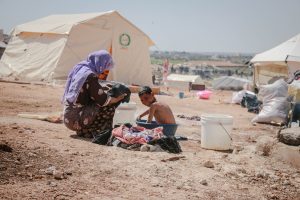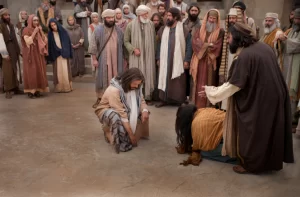Often, those in power do not pay much attention to ordinary people.
People who enjoy wealth and influence are not always keen to be associated with those who are less fortunate.
We know that God is almighty and his power is infinite, yet…
Yet, he does not keep at a distance from the human beings he has created.
Amazingly, he identifies with them, even the poorest and most needy.

 This is what today’s 1st reading tells us very clearly (Exodus 22:20-27).
This is what today’s 1st reading tells us very clearly (Exodus 22:20-27).
This text of the Book of Exodus speaks of the foreigner, the widow, the orphan, the poor who pledged even his own cloak.
All such people are people in need and not only does God cares for them, but he also wants us to do the same.
He tells us to do so in very strong words.
God insists that we must not take advantage of people in need.
“My anger will be aroused”, says God, if we do not obey his command.
 And he adds: “When they cry out to me, I will hear, for I am compassionate”.
And he adds: “When they cry out to me, I will hear, for I am compassionate”.
To the people listening to him, this is precisely what Jesus will teach:
“You must be compassionate, just as your Father is compassionate” (Luke 6:36).
This is what is expected of us in these our days…
The migrants and the refugees are at our door…
The widow and the orphans are waiting for help…
The poor of all kinds are begging for assistance…
Compassion is what they are all hoping for…
Note: Another text is available on a different theme, in French, at: https://image-i-nations.com/30e-dimanche-de-lannee-a-2023/
Source: Images: pexels.com (Ahmed Akacha) unsplash.com (Jon Tyson) Bible Portal
 May the Spirit of forgiveness lead us on this way,
May the Spirit of forgiveness lead us on this way,

 Certains diront: ‘C’est une question de vocabulaire…’
Certains diront: ‘C’est une question de vocabulaire…’
 En 2004, le sénat des Etats-Unis d’Amérique a unanimement voté la résolution 436, qui prévoit que le 2éme dimanche du mois de décembre devient officiellement une journée mondiale commémorative des enfants décédés. Outre atlantique, leur action est connue sous le vocable «
En 2004, le sénat des Etats-Unis d’Amérique a unanimement voté la résolution 436, qui prévoit que le 2éme dimanche du mois de décembre devient officiellement une journée mondiale commémorative des enfants décédés. Outre atlantique, leur action est connue sous le vocable «  2022 Theme: End racism. Build peace.
2022 Theme: End racism. Build peace.

 But have you ever received a message written on… sand?
But have you ever received a message written on… sand?